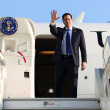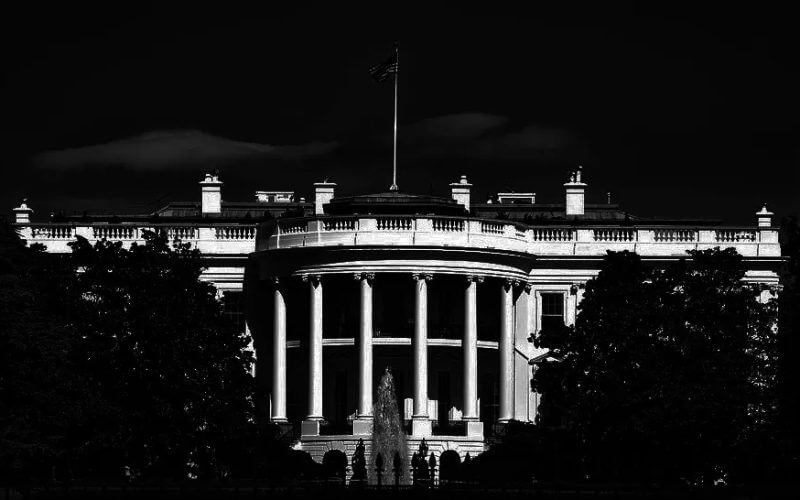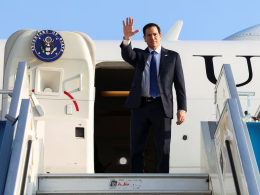1. Lyndon B. Johnson
Despite only being president for four years, the LBJ administration engaged in conciliatory policies with the Soviet Union, stopping short of a containment policy introduced by the Eisenhower administration. With Johnson focusing heavily on domestic affairs while in office, weak foreign policy resulted in the Vietnam War, with repercussions on the US and Southeast Asia. The Johnson administration's inability to control urban centers in South Vietnam, and the failure to understand the country's terrain were significant reasons Vietnam fell. As a result of his actions, the number of American soldiers increased from 16,700 when Johnson took office to over 500,000 in 1968, escalating tensions between the North and South Vietnamese. Additionally, the Johnson administration's inability to explain to the American people the need for US force and presence in Southeast Asia divided the nation, which would come back to assist opponents of Richard Nixon and his administration. The administration's actions boosted the USSR and China, who viewed the US as weak and could be pushed back.
2. John F. Kennedy
Coming from the years of the Eisenhower administration, which were highly active in preventing communism's influence, President John F. Kennedy and his foreign policy team moved away from this stance. Instead, the President tried to limit American involvement on the international stage despite the expansive actions of the Soviet Union. One disastrous foreign policy decision by President Kennedy that still lingers on to this day is Cuba's fall into a communist dictatorship that has impacted the lives of many Cuban citizens. As a result of the failed Bay of Pigs invasion initiated by the Kennedy administration, the Soviet Union was able to use the small island to grow its presence close to the US and lead to what was known as the Cuban Missile Crisis, which nearly brought America and Russia into nuclear war. Despite vowing to support allies against communism, the Kennedy administration opted to shun allies like the Shah of Iran and others, freezing military spending unless they adhered to the administration's demands. In Southeast Asia, the President announced plans in 1963 to reduce the number of American officials in Southern Vietnam assisting troops in their fight against communist Northern Vietnam.
3. Jimmy Carter
Jimmy Carter believed that the US focused too heavily on the threat of communism, calling instead for a reevaluation of America's support for allies in Latin America and the Middle East and greater emphasis on "human rights." Following the 1979 Sandinista movement against Nicaraguan President and US ally Anastasio Somoza, President Carter recognized the new communist-leaning government, despite its many human rights abuses and support from the Soviet Union. In the Middle East, Carter's decision to undercut America's longstanding ally, the Shah of Iran, assisted the Iranian monarch's enemies, resulting in the toppling of the US-backed monarchy and the country's descent into an Islamic theocracy that has caused chaos and terror in the Middle East against Americans, Israelis, and Arabs for over four decades. Carter's policy towards Iran also led to the 1979-US hostage crisis, where several Islamist students took over the US Embassy in Tehran for 444 days while America felt helpless to do anything. Even after he was out of office, Jimmy Carter was active on the foreign policy stage in the Middle East, Latin America, and Asia, praising anti-American dictatorships in North Korea and Venezuela while openly supporting and meeting with officials from the Islamic terrorist group Hamas.
4. Bill Clinton
Despite various domestic victories, Bill Clinton's foreign policy was a series of failures. Following the investigation into the Monika Lewinsky affairs, Clinton engaged in several foreign policy actions, which many believed were a distraction to get the American people's attention away. Under the Clinton administration, the US-brokered an agreement between the Palestinian Liberation Organization (PLO) and the Israeli government known as the Oslo Accords, which resulted in more terrorism and violence against Israelis despite Clinton and his allies promising peace after Israel provided multiple concessions. After the assassination of Israeli Prime Minister Yitzhak Rabin, Clinton, and his administration did everything to prevent the Conservative Likud Leader Bibi Netanyahu from winning the Israeli election and stopping the Oslo Accords. As Civil War in Somalia occurred, the lack of military equipment asked by officials at the Pentagon resulted in the death of numerous Americans and civilians, prompting the Clinton administration to withdraw all troops from the African country. When American embassies in Tanzania and Kenya were bombed by an Islamic terrorist group called Al Qaeda, led by Osama Bin Laden, the Clinton administration gave up the opportunity to kill the Islamic leader, suggesting to the terrorist group that the US was a mere paper tiger.
5. Barak Obama
Following the Bush Presidency, President Obama sought to decrease America's role in the international arena, opting instead for the progressive viewpoint that America's actions on the world stage had upended peace and stability and that the US had to take a step back in foreign intervention. The President and his progressive-left wing foreign policy officials opted to open negotiations with the Islamic Republic of Iran over its nuclear program, ignoring warnings and concerns from longtime American allies like Saudi Arabia and Israel. The 2015 Iran nuclear agreement authored by the Obama Administration allowed the regime in Tehran to partake in nuclear enrichment and obtain economic sanction relief while ignoring the calls from ordinary Iranians protesting against the government. On Israel, the Obama administration used the power of the US State Department to undermine then Israeli-Prime Minister Benjamin (Bibi) Netanyahu, blaming Israel for the Israeli-Palestinian conflict and calling on the Jewish state to return to the disastrous 1967 borders. During the 2011 Arab Spring, the Obama administration supported the protest movement, promising that democracy would flourish in the region, resulting in the overthrow of Egyptian President and American ally Hosni Mubarak and the rise of the anti-American terror group, the Muslim Brotherhood. In Libya, the Obama administration and Secretary of State Hillary Clinton supported the movement against Libyan Dictator Muammar Gaddafi, resulting in terrorism, disorder, chaos, and the death of American officials in Benghazi.
Related Story: 5 Best U.S. Foreign Policy Presidents










